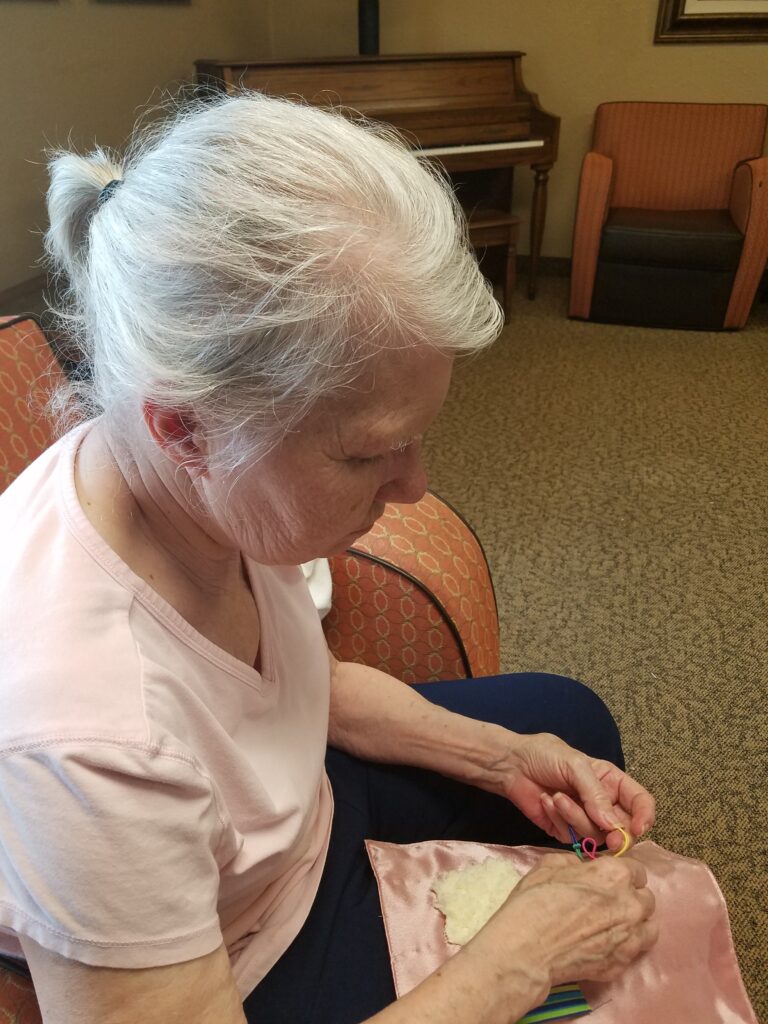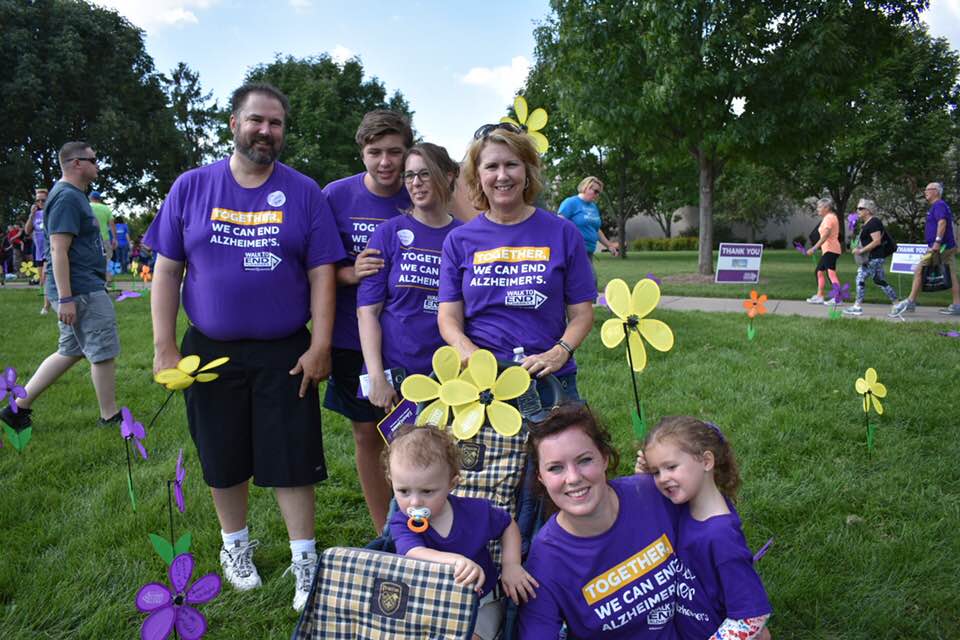Posted 8-9-19
Yesterday’s mini birthday party for mom was nice. We all gathered around and sang Happy Birthday to her (with her joining in) over a cupcake, likely the highlight of the time for mom. Our big bash is Saturday where over 20 will be there including friends and family. We will all be wearing purple and will sport a Walk to End Alzheimer’s flower or two too.
It occurred to me last night, possibly for the first time, that this will likely be her last birthday party. You see, for you poor folks new to this stinkin’ disease, you have plenty of time to start mourning long before you need to start mourning only to mourn yet again when your loved one passes away. –Oh crud…the secret is out of the bag. Now nobody will choose this disease!! 🙁 — It is particularly insidious that way.
So, how do you prepare a last birthday? You prepare it the absolutely best way you can, just like any other visit except perhaps you try to capture memories and serve him/her with newfound zeal.
So how do you visit someone with late stage Alzheimer’s, if you are unfamiliar with the progression? Here are my tips for visiting, especially if you haven’t been:
- Read my last 275 blog posts. I don’t get money for this, I am just thinking that I have hit on the highs and the lows quite a bit in my 150,000 words.
- Call ahead and learn the drill (if in a care facility). There may be visiting hours (hopefully not…should be 24/7). There will likely be entry/exit procedures that if you know about them ahead of time you will be less anxious. Punch codes, attendants, etc…
- Ask the staff or the caregiving loved one when is a “good time” to visit. Perhaps none are particularly great, but there are times that are better than others. Perhaps he/she is sundowning. That factors into the best time too.
- Bring a gift. Couple things here… If your loved one is in a memory unit/care facility of some sorts, know that everything tends to be community property. Stuffed animals, slippers, false teeth, coloring books, etc…all tend to end up in someone else’s room/mouth. Think of it as adding to the collective joy of all of his or her roomies. It is still worth it.
- Consider donating a fidget blanket or cuff.

- Plan to stay a while. If you are in a facility, say hi to all the staff you can find and introduce yourself. They need to see his or her loved ones. I honestly believe, whether it is conscious or subconscious, it does improve their care.
- Visit and introduce yourself to the rest of the patients. You may be the only one that stops to visit with them that day.
- Make and keep eye contact, at his/her level so he/she doesn’t have to look up at you.
- Hugs are nifty unless you sense that they don’t want one. Ask first “How about a hug?” Physical touch is so important for people of all conditions in life. I hold mom’s hand every single time I go. You can figure that out as you go.
- Turn down the TV/Radio. Distractions and loud noises deter from the good communication and add to anxiety.
- Introduce yourself and use both your and his/her names in conversation. I always, always, always, come up to mom and say “Hi Mom! If it isn’t my number one Momma! Your very only youngest son Mark is here!!!” and make a big production of it. It never sounds like I am trying to help her know who I am, but it is just a matter of fact tone. This document says use first names instead of titles since they often think of their kids as very young. I had never considered that. I may switch to calling her something different, but it would feel odd for me to call her by her first name. Debating this one as I type…
- Speak slowly, enunciating clearly, but in a conversational, loving tone. Non-verbal cues like smiling and winking are better than grimacing and cowering. They can still read you in most cases. Have fun and enjoy the visit for what it is.
- Don’t quiz them. Just don’t. I have a loved one that does this waaaaaaaay too much and it drives me crazy and it makes mom grimace. Mom is not learning much in the way of new information. Our quizzing her will NOT help her remember anything. Instead, I reminisce with her. “Instead of ‘Remember when we used to fish?” it is ‘Oh mom, you are quite a fisherman’. ‘Boy have we caught a bunch of fish in our day, and even a few trees and old boots!!'”. She may go along with it and laugh or she may actually add something that she remembers, but she doesn’t get sad about not knowing an answer.
- Avoid long sentences or stories. Keep It Sweet & Simple.
- It is OK to fib in certain circumstances. I said it… I am a Christian. I believe, wholeheartedly in the sufficiency and the truth of scripture…completely. However, I also believe it is OK to tell your loved one that you have to leave to go to Wal-Mart and you will be back instead of saying you are going to go home. Honestly, you are going to Wal-Mart soon enough and you WILL be back. Why prompt them to want to go home by bringing it up. Lying, like the rest of the Law in the Bible, is about the heart, not about the letter. I am not diminishing the importance of it at all, just pointing to the correct application of it. Our standard is higher than we know, but I think preventing a sick relative from being sad by massaging the truth a little has the right heart motivation.
- Be prepared to change topics and/or redirect conversations away from things like going home. If it seems like something is going poorly or anxiety is building, not unlike working with a toddler, tell him a story or show him a picture on your phone. Use positive statements instead of negative ones.
- Consider going outside to get fresh air, if that is practical/allowed. Talk to staff/caregiving loved ones first.
- Sweet/favorite treats are often a hit.
- If someone is already visiting, perhaps wait until he/she leaves. Too much stimulation can cause anxiety. Our party for mom Saturday risks this for sure. 🙁
- Focus on older stories and memories over newer ones. Play older music instead of newer music. Use older nicknames instead of newer ones. See a trend? They remember longer-held memories better than newer ones.
- Allow them the freedom to repeat the sentence, the story or the memory or even get the details wrong. Correcting them is worthless and can be hurtful. Just listen and enjoy the story again. It is important enough to them to tell you multiple times. Help them by letting them repeat it as if you have never heard it before. One of the Sweet 17 tells me every day at least 4 times “I am from (nearby city name).” While my answer might be different, I never tell her she has told me that before. “Great Mrs. M., I had a car repaired there one time” or “Really! I bought my favorite ham sandwich at that fine town!”.
- Don’t talk about departed relatives or friends. If they ask, say “He/She is doing much better these days”. Again, if dead this may seem like a fib, but if they are in heaven, of course they are better.
- Don’t judge your loved one, nor yourself harshly. The disease caused the dirty word to come out. Don’t blame yourself or self-talk into being more sad. Things are as they are, make the best of it.
- Understand the disease as best you can and have lower expectations for conversation and higher expectations for just being there and loving them.
- Get a plan to go on a regular basis if possible.
Here are some websites that even more tips:
Tips 1 Tips 2 Tips 3 Tips 4 Tips 5 Tips 6 Tips 7 Tips 8 Tips 9 Tips 10
Thank you for all of the encouraging words/prayers, for subscribing to the blog on the website, for donating, for Walking September 21st with is, and for all of the many other things each of you do to make this worthwhile. 🙂 I appreciate each and every one of you!
#EndALZ

